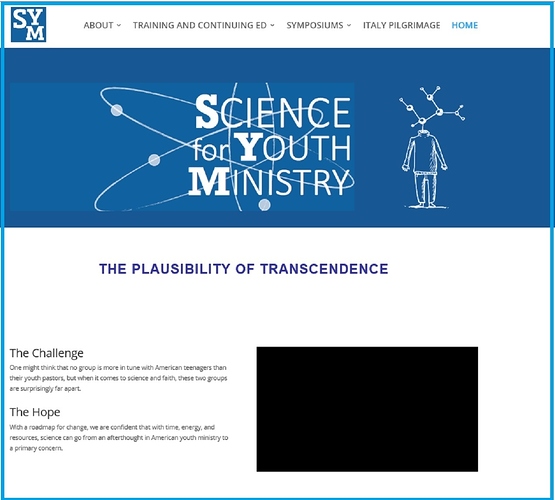This is a companion discussion topic for the original entry at https://biologos.org/blogs/guest/facing-the-rivalry-between-faith-and-science-in-youth-ministry
What a relevant article for me, as we have a new youth minister coming in and I have told our pastor I am interested in sitting down with the two of them to discuss these issues, trying to offer my help and be a blessing rather than being just another voice pushing an agenda. Any suggestions along those lines?
I look forward to book coming out and will be first in line to read and gift.
Towards the end of the article, it features a link to this project!
THE PLAUSIBILITY OF TRANSCENDENCE
The Challenge
One might think that no group is more in tune with American teenagers than their youth pastors, but when it comes to science and faith, these two groups are surprisingly far apart.
The Hope
With a roadmap for change, we are confident that with time, energy, and resources, science can go from an afterthought in American youth ministry to a primary concern.
It is not possible, I think, to overstate the significance of this project. Last week, Allen Downey, in a Scientific American blog, showed that in the past thirty years, the percentage of college freshmen who report they have no religious affiliation rose from 10 percent (1986) to 31 percent (2016). The survey results are highly reliable (tens to hundreds of thousands of freshmen take the survey each year), and indicate a significant–likely unparalleled–swing toward the secularization of today’s youth. This trend is emphasized in an important BioLogos blog of several years ago, in which it shows that the Barna organization reported that “nearly three out of every five young Christians (59%) disconnect either permanently or for an extended period of time from church life after age 15.”
We are headed into an age where artificial intelligence and genetic engineering have the potential to significantly change the nature of what it means to be human. (See two just-published books, “Homo Deus” by Yuval Harari and “From Bacteria to Bach and Back” by Daniel Dennett for highly secular and particularly scary accounts of what may be on the horizon.) For society’s next generation to be leaving Christianity in droves at the time when Christ’s Presence through his followers is needed most puts a special onus on all of us to determine what we’re doing wrong and how we can once more become the witness we need to be for the sake of young people. Scientism is by no means the only reason, of course, why our youth are leaving the church (click on the link to the BioLogos blog above for a brief analysis), but it is part of the package. No matter what as we move further and deeper into this technologically driven age, the scientifically informed Christian voice is going to be urgently needed.
Perhaps we should put the question of youth ministry discussions of faith and science in the context of ministry more broadly. How many pastors are open minded–in some degree–toward science of origins but would not dare raise the issue even in conversation with church members? I know of cases personally. If they brought up the subject in any way other than to bash evolution, they would no longer be pastors. Period. The same is true of youth leaders. It’s not just a difficult topic, it can and often will mean an explosive reaction and the end of fellowship with believers they have known all their lives. I laud the people at Biologos for their work, but at times I get the impression that they live in an insular academic environment, unaware of the depth of suspicion, rejection, and yes, hatred of origins science and its proponents on the part of the majority of church-going American evangelicals.
No doubt you are right. Even though I suspect the old earth and young earth adherents are about equal in our church, discussion of the subject is sort of a forbidden topic, for the reasons mentioned. How then can we be supportive without being a liability? My thought is perhaps through para church programs, perhaps even with something like the Alpha course started at HTB.
Any thoughts or suggestions?
I like the Alpha course. What we’re presupposing is a safe environment for discussion in which evolution, Big Bang, etc. are not automatically labelled God-dishonoring atheist propaganda. Broadening that environment is the task. Personal conversation, gingerly, with believers who give some hint of open-mindedness will probably help–over the course of decades and generations. I wish I had a better answer.
